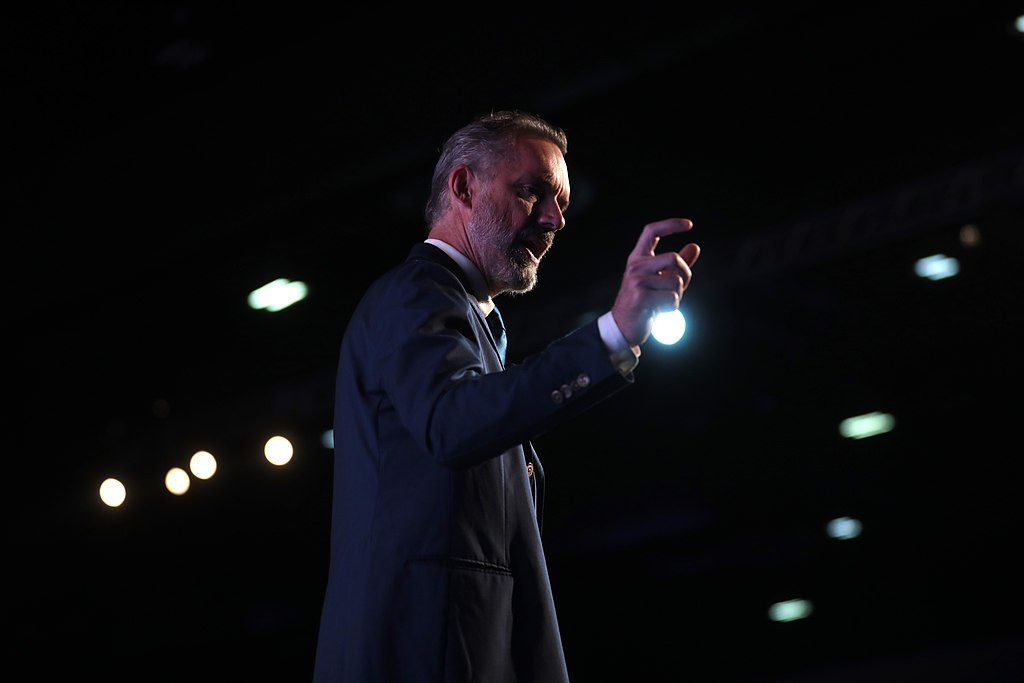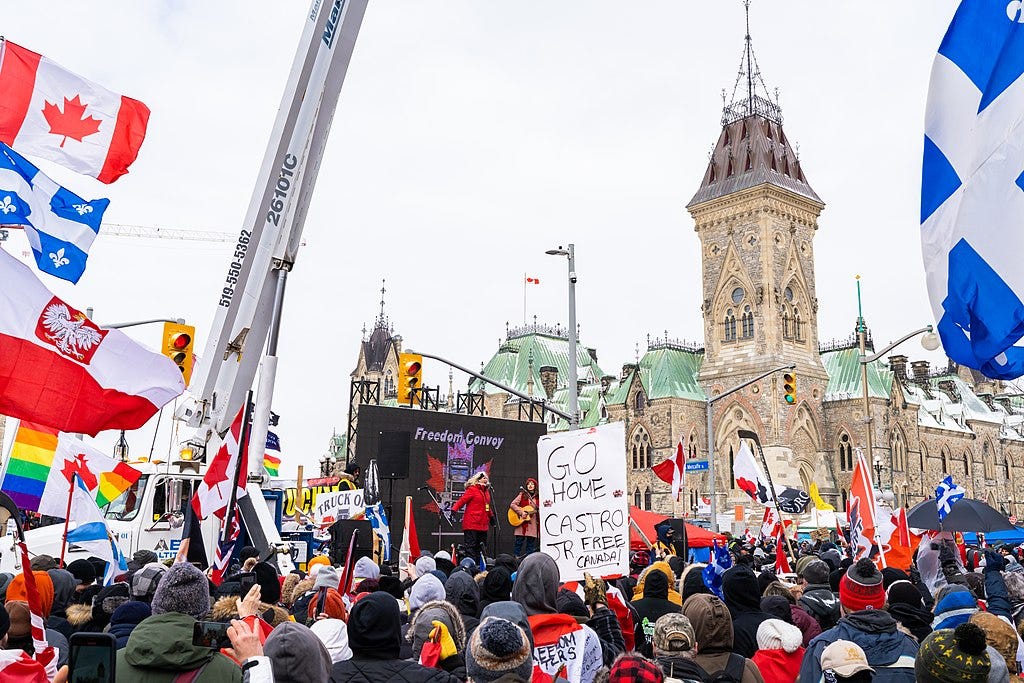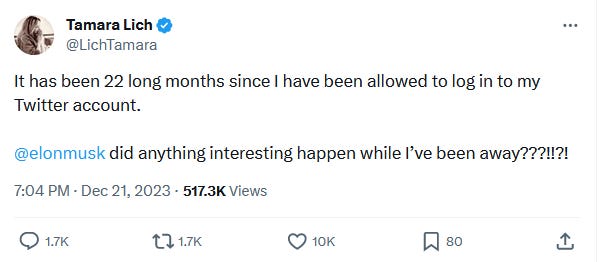Justin Trudeau's Canada: A Cautionary Tale of Receding Freedoms
Jordan Peterson warns us that we should pay close attention to how Canada is curbing freedoms. He is right to do so and not only because of his own experience.
Jordan B. Peterson does not need that much introduction. A well-known psychologist and professor who together with his students and co-authors has published more than 100 research papers and written several books. He is an accomplished speaker whose talk shows on a wide range of topics – from debates on current political choices and the challenges facing the world to insights into the history of religion – are watched by millions of people around the world.
But Peterson is also Canadian, and Canada is the country he warns the world not to follow. "This is where the reader should pay careful attention, Canadian or otherwise, because this is what lies ahead in the West, given the course our leaders and their still-blind and deaf followers are charting," he wrote in an opinion piece last week. He did so based on personal experience. For more than a year, Peterson has had to fight to keep his licence from being revoked by The College of Psychologists of Ontario, the Canadian provincial board that has the power to recognize psychologists. In essence, it is not just a professional organisation, but the state has delegated to the College of Psychologists the decision on who can and cannot practise as a psychologist. Revoking the licence would mean that Peterson would no longer be allowed to practise – something he hasn't actually even done since 2017, as he mainly does his podcasts and writing. But more than that, he would not be allowed to use the title "psychologist" if he loses his licence.
Social media 're-education'
What makes the story particularly absurd is that to retain his license, Peterson would have to undergo a "coaching program" to "reflect on, and ameliorate [his] professionalism in public statements." The program costs up to $225 per hour, lasts six months, and would be paid for by Peterson. The college's decision was based, as always in such cases, on complaints. However, none of them concerned his work as a psychologist, only his public statements.
Such complaints started to be lodged against him in 2016 when he became more widely known for his views – explicitly opposing the so-called transideology, according to which men can turn into women if they wish and vice versa, and refusing to use pronouns some trans people want others to use like they/them or ze, zir, xi, etc. The list is long.

Peterson has also repeatedly criticised the issue on social media. For some of his posts, he has been punished. For example, he made a critical post about the well-known actress Ellen Page, who now wants to be called Elliot Page after a mastectomy. "Remember when pride was a sin? And Ellen Page just had her breasts removed by a criminal physician," Peterson posted on Twitter (now called X) in June 2022. As is known, for LGBTQ circles, June is known as a pride month. Following Peterson's post, the platform blocked his account. He was only able to reopen his account after Twitter was bought up by Elon Musk, who sometimes calls himself a 'free speech absolutist'.
Complaints about Twitter posts
The post about Page is one that was the subject of a complaint to the Canadian College of Psychologists. But there were many more. One, for example, concerned a post by Peterson in January 2022 in response to a previous post by a user named Roger Palfree. Palfree had expressed the view that too many people were overpopulating this small world. "You're free to leave at any point," wrote Peterson.

He was also accused in one of the complaints of a comment he posted in May 2022 about the front cover of Sports Illustrated magazine, which had chosen a photo of an overweight woman. "Sorry. Not beautiful. And no amount of authoritarian tolerance is going to change that," Peterson wrote.
There were more similar complaints about him, some of which accused him of critical comments directed at politicians or their associates. In February 2022, for example, Peterson criticised Ottawa City Councillor Catherine McKenney who was known for calling for stronger intervention by the central government and police in the dispersal of a massive protest in Ottawa known as the Freedom Convoy. "Appalling self-righteous moralizing thing," he wrote of McKenney. McKenney uses the pronouns they/them.
In addition, Peterson was accused of criticising Gerald Butts, the former principal secretary to Prime Minister Justin Trudeau, calling him a “prik” (sic) and also crticising Trudeau himself on another occasion. One of the 'accusations' levelled against him also concerned the sharing of a post by Pierre Poilievre, leader of the opposition Canadian Conservatives, in which the politician criticised the unnecessary Covid restrictions. Another complaint was related to Peterson's participation in the popular Joe Rogan podcast, where, among other things, he criticised what he calls “the power-mad climate apocalypse-mongers”. However, there must have been more allegations from the complainant's point of view, as the transcript of the entire podcast, which lasted more than three hours, was attached to the complaint.

After considering all these complaints, and analysing Peterson's social media posts, the College of Psychologists came to a conclusion that his public posts were "degrading, demeaning and unprofessional.” And therefore, in order to keep his license, he would need to be 're-educated'. Peterson, of course, did not accept this and appealed to the courts. In August last year, an Ontario court rejected his appeal, saying that the College of Psychologists was entitled to make such a decision and that it did not restrict Peterson's freedom of expression. Last week, the Court of Appeal for Ontario also rejected Peterson's appeal and he has no further right of appeal. In a commentary published after the ruling, Peterson vowed to fight on and said he looked forward to receiving a letter explaining how his "re-education" would now proceed.
Punishing protesters
Peterson's case is not an isolated incident of how a citizen might be treated in Canada if his or her opinions are not what those in power would expect. The way the Canadian state has behaved towards its citizens in recent years was vividly illustrated in the Covid crisis and its aftermath.
Just think of the brute force used by the Canadian state in February 2022 to disperse the people who had been protesting for several weeks in the capital Ottawa, led by truckers, against the vaccine coercion and the senseless Covid rules. In addition, the state froze the assets of people and companies involved in the protests.

It is important to note that the protest was entirely peaceful, but the Trudeau government decided to use the Emergencies Act to disperse it. Under this law, the federal government can declare a state of national emergency if something seriously endangers the health and safety of Canadians or seriously threatens the sovereignty, security, and territorial integrity of Canada. In essence, it is a law to be used in a situation of war - in 1988 it replaced the previous War Measures Act and since then the new law had never been used. The Act gives the federal government a great deal of power – for example, the right to ban and disperse assemblies or to freeze and confiscate the property of individuals. The unprecedented use of the law was already heavily criticised two years ago, and on Tuesday a Canadian court ruled that its use was not justified. "I have concluded that the decision to issue the Proclamation (of the Emergencies Act) does not bear the hallmarks of reasonableness – justification, transparency and intelligibility – and was not justified," Ottawa federal judge Richard Mosley wrote in a statement of the decision. The Trudeau government promised to appeal.
The way in which the organisers of these protests have been treated is also remarkable. Tamara Lich, for example, was arrested on 17th of February 2022 and initially refused bail by the court. She was only released on 7th of March.
On June 7 of the same year, she was arrested again, accused of violating the conditions of her first release. In particular, this was attributed to her attendance at a gala where she accepted an award for organising protests. The state interpreted this as a breach of the conditions of her release, as she was forbidden to meet other protest organisers who were present at the same gala. In addition, she was banned from social media, but she did participate in one podcast. Again, her bail application was initially rejected and she had to spend almost a month in prison before a higher court agreed to her release.
Although she has not been jailed since the story cannot yet be put to bed. Along with another trucker protest organiser, Chris Barber, they still face criminal charges and have to defend themselves in court. They are accused of mischief, obstructing police, counselling others to commit mischief, and intimidation. The long and gruelling proceedings themselves are a punishment in this case. But at least Lich was recently allowed back on social media - the ban on its use ended on 21 December last year.

A Polish-Canadian pastor, Artur Pawlowski, who protested against the restrictions imposed during the Covid crisis, was forced to endure a similarly lengthy trial. For failing to comply with the restrictions, he was fined more than 40 times, repeatedly arrested, and kept under house arrest. He was eventually charged with taking part in the same Freedom Convoy protests. Only instead of Ottawa, he was taking part of blocking a bridge linking Canada to the United States in Coutts. A significant proportion of trade between the two countries passes over this bridge. Pawlowski's involvement meant he gave a speech to the people protesting there. He was therefore found guilty of mischief for urging truckers to continue the border protest, i.e. blocking traffic on the bridge. For this, he was eventually sentenced to 60 days in prison.
Outside the Covid issue, other recent examples of abuse of power can also be highlighted. We recently wrote in our news round-up about how David Menzies, a reporter for the alternative publication Rebel News, who tried to interview Deputy Prime Minister Chrystia Freeland, was obstructed by the police and arrested. The whole event was filmed and the police's conduct led to widespread criticism. It is probably for this reason that Menzies was quickly released and not charged.
'Gender identity' as a human right
There are, of course, other thought-provoking cases. For example, the story from 2021 of a man who fought against his daughter's sex change and who was told by a court that he had no right to prevent his then 15-year-old child from starting hormone therapy. The court also forbade the man from publicly discussing the case. He was also forbidden from calling his daughter, who had decided to become a boy, or from using female pronouns when talking about her. However, the man decided to talk publicly about his concerns and continued to call the child his daughter. He was arrested for contempt of court and ended up serving a six-month prison sentence. Although the sentence was imposed for disobeying the court, it is important to note that the initial impetus was the fact that the man initially tried to protect his child through the courts but did not get help.
Also in 2021, a Canadian court ruled that if a person has chosen a 'gender identity' other than their true gender, it will be a violation of human rights not to accept this. The case concerned a restaurant waitress who no longer wished to identify as a woman and referred to herself as "they". The manager of the restaurant still called her by the female pronoun. As a result of the dispute, the restaurant owner decided to fire the waitress and she took the matter to court. The court ruled that such deliberate 'misgendering' was a violation of human rights. The waitress got $30,000 in damages and the restaurant was ordered to “implement a pronoun policy and mandatory training for all staff and managers about diversity, equity and inclusion”.
The protection of gender identity was added to Canada's human rights legislation in 2017. It was also added as a protected characteristic in the hate speech legislation, so in principle it would also be a way to prosecute Peterson's social media posts, for example. However, there have been no criminal proceedings on transideological grounds so far. Still, we know that, if the conditions are right, it is only a question of the authorities' willingness to interpret and use the law in this way. I have written in the past about how, at one point, criminal proceedings were initiated in Norway for non-recognition of gender identity.
Even if there are no such 'hate speech' criminal cases in Canada, there are examples of parents' protests against transideological literature being added to school libraries labelled 'hate speech' by the schools and the parents being prevented from making such protests at the school board meetings.
To sum up Peterson's warning, Canada of today stands out as a country in which personal freedoms are less and less respected, and the 're-education' of professors can only be followed by declaring them 'insane' if they do not comply. "I've studied authoritarianism for a very long time – for 40 years – and they're started by people's attempts to control the ideological and linguistic territory," Peterson commented back in 2016, when he refused to address people in a transideological spirit and came under criticism for it. I think we can now say that the comment was quite prescient. We are seeing more and more of these absurdities in Europe too. So when drawing conclusions and looking for deterrents, we need not think only of Canada. But under Trudeau's tactics, Canada has undoubtedly emerged as one of the most striking examples.




